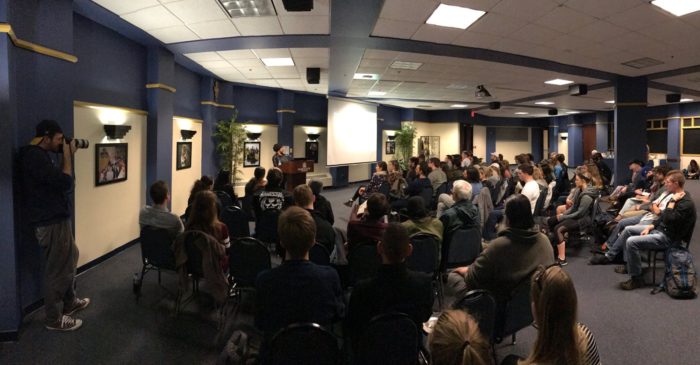By Thomas Salinas, Kristen Sheffer and Lydia Slattery
Marquette students and faculty, and Milwaukee community members funneled into the Alumni Memorial Center’s Room 163, Wednesday, at 4 p.m. Organizers brought in extra chairs. They hadn’t anticipated the crowd of more than 50 people who came to hear a speaker on the eve of Easter break.
The opportunity to meet one of the world’s leading human rights activists doesn’t happen every day.
Bahraini exile Maryam Al-Khawaja, 29, came to MU as part of the Marquette Democracy Project, which is bringing prominent activists from around the world to interact with MU students and the greater community. Al-Khawaja talked about being a lifelong human rights activist in Bahrain, a country with a monarchy that does not allow freedom of speech or assembly, and where political dissent is met with violence and imprisonment.
She stood at the podium dressed in a black leather jacket, black jeans and a black hijab. Giving an update on the situation in Bahrain, Khawaja said, “Right now, I feel like we’re not trying to make progress. We’re fighting to not regress.”
Protests in Bahrain were part of the 2011 Arab Spring. Al-Khawaja engaged in the peaceful pro-democracy protests opposing the authoritarian monarchy. Thousands of protesters took the streets and clashed with police, demanding more civil liberties. The government cracked down on the peaceful protesters and has since continued to strip citizens of basic human rights, she said.
In a country of 400,000 people, close to 4,000 people in Bahrain are in prison at any given time, Khawaja reported. Her father is serving a life sentence in prison for speaking out against the king. Her sister has been to prison 12 times in the past six years. Al-Khawaja herself is exiled from Bahrain, living in Denmark. If she returns to the country, she will be imprisoned, she said.
Al-Khawaja’s mother and sister remain in Bahrain. “Yes, I worry about them, but my mom inspires me to do this. She pushes me to continue to keep fighting and speaking,” she said.
Protesters in Bahrain face plenty of repercussions, she said, one of them being that thousands of them lost their jobs. This was especially problematic because a lot of families have only one financial provider.
Al-Khawaja discussed how the government and media have framed the uprising as sectarian fighting when that is not the case. She noted that protestors included Sunni Muslims, Shia Muslims, and Christians, as well as those who don’t subscribe to any religion. But the message the public hears is that there is a “Shia uprising, against a Sunni monarchy,” she said.
This framing leads people to connect the situation in Bahrain to Hezbollah, a Shia group that is considered by some to be terrorists, and to compare the uprising in Bahrain to the 2003 Iraq war, which was also portrayed as a sectarian civil war.
Journalists need to do a better job, said Al-Khawaja, who mentioned that a headline of a story about a recent protest said, “Protests Return to Bahrain.” She told the reporter that the protests had continued; he was the one who had returned.
The ruling monarchy is emboldened by the current United Kingdom and United States’ administrations, she said. They ignore human rights violations in order to protect their interests in the Gulf’s resources. The monarchy stays in power because of their Western allies, she added.
Despite the brutality and lack of support, Bahrainis continue to fight for democracy because they cannot go back, she said. “People always ask me if we want a democracy like the United States, but no, we want something better after what we’ve been through.”
The Bahrain civil rights movement goes back to the 1920s when they protested the British rule. During the 20th century, oil was discovered on the island, and with the high demand for oil, Bahrain quickly capitalized and became relevant in the region. With the help of Iran, the young kingdom gained independence in 1971, when they were officially recognized by the United Nations as an independent nation.
Al-Khawaja said she knows she is privileged to be able to travel the world to speak to governments and organizations about the plight of Bahrainis. She sees herself as a megaphone, carrying the voices of others who are not free to speak, she said.
The audience had no shortage of questions to ask Al-Khawaja about her activism. Questions continued until one of the event organizers, Dr. Jessica Rich of the Political Science Department, called the session to a close.

